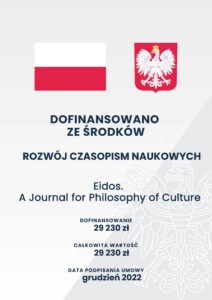Profile
Eidos. A Journal for Philosophy of Culture is an online, international English-language quarterly journal devoted to, broadly understood, philosophy of culture. One of our main tasks is to promote the development of philosophy of culture as a distinct sub-discipline within contemporary philosophy – to identify its main methods and problems.
As we believe that philosophy of culture nowadays can – and should – play a synoptic role, we see as one of our main tasks to initiate an ongoing international debate which involves different philosophical perspectives and methods as well as various academic disciplines: sociology, psychology, economics, media sciences, cultural studies, and so forth.
Eidos. A Journal for Philosophy of Culture is, in principle, a problem-oriented journal, which means that we are much more interested in identifying and addressing problems crucial to philosophy of culture today than in historical or exegetic perspectives. To be sure, this does not preclude using interpretative tools taken from the vast inventory of the history of philosophy – but first and foremost, we are interested in possible ways of applying them in analyses of contemporary cultural phenomena.
Eidos. A Journal for Philosophy of Culture is affiliated with the Faculty of Philosophy (previously the Institute of Philosophy) at University of Warsaw and was created as a part and an effect of international research projects carried by the Department of Philosophy of Culture at this Faculty. The journal is edited in cooperation with the Department of Philosophy at Southern Illinois University Carbondale and “The Humane Philosophy Project” – a research project based on the cooperation between the Department of Philosophy of Culture and the University of Oxford (especially the Ian Ramsey Centre for Science and Religion and the Blackfriars Hall).
Structure
Each issue will be divided into three general sections:
- The Thematic Section: collects essays analyzing the problems connected with an issue’s leading topic or problem. All essays for this section are subject to peer-review process.
- The Forum: collects essays on different topics not referred to (or loosely connected to) the above mentioned leading topic. All essays for this section are subject to peer-review process.
- Discussion Papers, Comments, Book Reviews: presents readers with short papers by eminent contemporary thinkers commenting on their recent and ongoing research, discussion pieces devoted to contemporary issues and events in philosophy as well as substantive assessments of books which are relevant to philosophy of culture. The essays for this section are not subject to peer-review process. They are only subject to editorial assessment.
Starting from volume 7, we use iThenticate plagiarism detection software to check all submitted papers.
The journal is published by the University of Warsaw.
Eidos. A Journal for Philosophy of Culture is an Open Access Journal with no subscription charges. The Journal does not receive any revenues from publication of regular issues.
The Journal is financed by the University of Warsaw.
Any revenues from special issues, supplements or any other form of subsidies or sponsorships that occur on an irregular basis, do not influence the decisions of the Editors. There is no subscription fee.
Due to the brutal full-scale war of the Russian Federation against Ukraine and its sovereign people, Editorial Board members of our journal do not engage in any formal relations with Russian institutions – universities, research institutes, journals, and any other sites that promote (contribute to and/or benefit from) Russian authoritarianism, nationalism, and Russian imperialist policies. This regulation is based on the resolution of the Polish Ministry of Education and Science and recommendations of the National Science Centre (Eidos. A Journal for Philosophy of Culture is a journal based in Poland). This will remain in power until the complete withdrawal of the Russian army from Ukraine.
The full volume of Eidos. A Journal for Philosophy of Culture consists of four issues (except the first volume) published quarterly. An issue for each quarter is published around one month after that quarter ends (e.g. an issue for the first quarter is published around the end of April).
All issues of Eidos. A Journal for Philosophy of Culture are archived in the digital repositories of the National Library of Poland.
ISSN: 2544-302X
DOI: 10.14394/eidos.jpc
The Polish Ministry of Education and Science’s register of journals (2024): 40 pts.
Czasopismo Eidos. A Journal for Philosophy of Culture otrzymało dofinansowanie w wysokości 29 230,00 zł z budżetu Państwa w ramach programu “Rozwój Czasopism Naukowych” w latach 2022-2024 z przeznaczeniem na realizację celu: wzmocnienie pozycji, rozpoznawalności i cytowalności Eidos. A Journal for Philosophy of Culture w polskim i międzynarodowym środowisku filozoficznym. Nr umowy: RCN/SP/0488/2021/1.

Open Access Statement
This is an open access journal which means that all content is freely available without charge to the user or his/her institution. Users are allowed to read, download, copy, distribute, print, search, or link to the full texts of the articles, or use them for any other lawful purpose, without asking prior permission from the publisher or the author, as long as the author and original source are properly cited. This is in accordance with the BOAI definition of open access.
![]()
This work is licensed under a Creative Commons Attribution-NonCommercial-NoDerivs 3.0 Unported License. Submitting a text to Eidos. A Journal for Philosophy of Culture means that the author agrees with the general conditions of this license. The author does and will maintain copyrights and publishing rights for his/her article without any restrictions.
